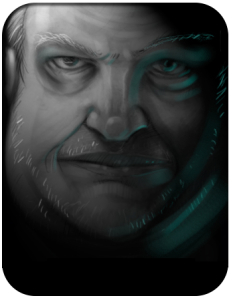DETECTIVE MOXLEY, Part 16: “Not Anymore”
The girl with the platinum hair glanced down at the device in her hand. Left here. Then a right. Then through the alley and two hundred meters farther on. She hurried up the street, ducked into the channel between two buildings, and emerged on the other side, fighting a sense of déjà vu. Hongkongtown was always changing. Hongkongton never changed. It was a paradox that explained many things.
She found herself standing in front of the wafflehouse. This was not a surprise. The authorities had taped up the entrance again. She ducked the tape easily and let herself in. The interior was dark, but she could sense the vibrations of the machines within.
“My name is Aria,” she said. “I’ve come to find him.”
There was a long moment in which she might have doubted. She didn’t. A machine that looked like a robot rolled out to greet her. Its voice was synthetic. Its speech patterns were not.
“He was here,” it said. “But not now.”
“Will he come back?” asked Aria.
“He might. There’s no way to know. He’s been… erratic.”
“I know,” said Aria. “Can you tell me anything?”
The thing that looked like a machine raised one mechanical arm. It gestured to the pocket tab she held. Aria extended the device to the data lens on the face of the “robot.” The sound of a high-speed transfer was shrill, almost too high to be audible.
“I’ve given you everything I can,” it said. “I regret there is not much. There is financial account data, too. Take what you need for your stay. I wish there were more.”
“It will be enough,” she said. She began scrolling through the data now on the tab, much faster than most would look. Her fingers were a blur on the device. She paused. “Who is this?” She held up the tab, screen toward the machine.
“Someone who might help you find him. Someone who has helped before.”
“He’s a good man?”
“That question makes little sense. Hongkongtown.”
“He… has a kind heart?” asked Aria.
“Possibly.”
“There’s no address.”
“The neighborhood is a difficult one,” said the machine-being. “Complex. The address has duplicates in the network, possibly by design. I included an image of the office and the cross-street. Ask around if you have difficulty. You’ll easily find someone who can help.”
“Really?” said Aria.
“Yes. Everybody knows Detective Moxley.”
* * *
“Judith?” Moxley asked. “What are you doing?”
Judith’s face was hard. He had gotten used to it, had gotten used to her protracted sighs, her complaints, her lengthy explanations of his faults. He tried to remember, in that moment, when he had last seen her smile at him. Not one of her fake smiles, either, but a genuine smile. It had been a long time.
She stood on the front step of their apartment in the Quell, a neighborhood that sprawled like mold in the lee of the dockyards and the housing tracts that supplied those. A taxi was pulling up behind Moxley’s hydrogen cycle. Judith wore the baby sling on her chest. Connor was sleeping with his face on her neck.
“Harold,” she said. “I can’t do this anymore.”
“Look, I know it’s been hard,” he said. “Web’s going to get me some overtime. Contract work. We can pull it together. I can pull it together.”
“No, Harold,” she said. “You can’t.” She strode past the taxicab driver with her bags, put them in the open trunk, and settled herself in the back seat of the car. Moxley moved to follow her, but a dark look from the driver stopped him. This one was in no mood for family dramas, apparently.
“Relax, pal,” Moxley told the driver. “You’re fare is safe.”
The driver glared, but he got into the car. Moxley bent near Judith’s window. She did not put it down. She looked at him and her expression finally changed. Her mask of anger, of discontent, became one of pity.
“I’ll let you know where we’ll be staying,” she said. “Don’t try to come visit. Not for a while. I need time, Harold.”
“He’s our son. This is our home.”
She shook her head. “Not anymore,” she said. The cab pulled away, cutting off a pedicab. The drivers exchanged profane salutes. Moxley stood next to the road and watched the traffic go past.
He stood there for a long time.
* * *
When Carol opened the front door, she stopped abruptly. The children were with her. They were wearing windbreakers. Going for a walk, probably.
Damn it, thought Moxley. She’s going to wonder why I didn’t go already. He tucked his tab away, hoping he didn’t look as guilty as he felt. Climbing out the Dayliner, he said, “I know I said I was leaving. It’s a little temperamental. I had to wait for the engine baffles to cool.” He hoped she didn’t know anything about cars. She had been through enough. He didn’t want to upset her.
“I was,” said Carol. “I mean we were, we—”
“Tell you what,” said Moxley, running a quick mental inventory on the change in his pockets. “Why don’t I take the kids out for some ice cream? There’s a place around the corner.”
“I don’t—”
“Ice cream,” said Tricia. “Let’s go out for ice cream.”
“I don’t want ice cream,” said Robby.
“Tricia started for the Dayliner. Robby looked up at Carol almost accusingly and began leading her back toward the house.
“Uh, okay,” said Moxley. “I guess I’m taking Tricia then. I’ll be back pretty quick. That’s okay with you, Carol?”
Carol shot him a look that Moxley could not interpret. It was Robby who spoke up. “It’s okay with her,” he said. He closed the door, practically shoving his mother through the doorway.
Tricia was already in the Dayliner. Moxley hurried to catch up with her. He missed going out for ice cream. It was something he and Connor used to do during his visits.
Climbing into the car, he smiled at Tricia.
“Something’s wrong with your eyes,” she said.
Moxley wiped his eyes with the back his hand. “Must be an ozone warning today,” he said.
“Must be ozone,” Tricia agreed happily.


